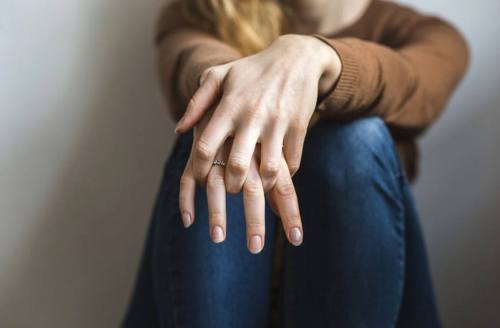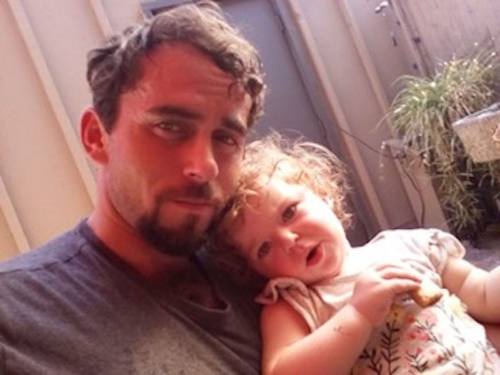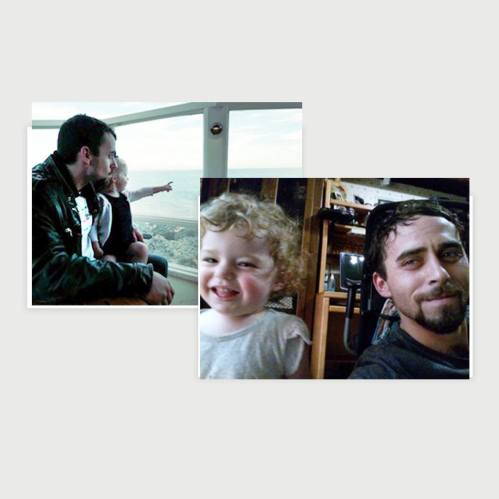“He was kind, loving, and sweet—but his addiction was the one thing everyone focused on”
Three women share what it's like to date someone battling opioid use disorder, and addiction experts weigh in on when and how a relationship can survive it.

Kristin Farrell was 36 when she met Seth at a bar in San Francisco. A 24-year-old artist with a big personality, he had a talent for charming people—including Farrell, who was smitten right away. The early days of their relationship were care-free and fun; Seth would often share the projects he was working on with Kristin, like the comic book art he did just for kicks. She loved that he had such a strong creative side.
Farrell didn’t know Seth was a heroin addict when they started dating, but some scary signs started tipping her off as their relationship progressed. “He’d be in the bathroom too long, and there would be blood on the floor,” she remembers. “I think I didn’t want to believe that his problem was so severe. When we fell in love, I thought maybe I could save him.”
For years, she supported Seth’s attempts to quit using, and weathered the disappointment each time he failed. “It was a constant fear that something was going to happen to him. You live in that terror; it’s so hard to love someone like that,” Farrell says. She got used to seeing blood splatters on the carpet and finding needles around the house. “That was my reality: blood and needles,” she says. She’d swear she’d leave, but then cave, crying and telling Seth how afraid she was that he was going to die.
Partially because she felt dating an opioid addict was a shameful secret, and partially because she didn’t think anyone would understand her love for Seth, she didn’t talk about what she was going through, choosing isolation over potential judgement. “There’s this stigma that junkies are gross, but he just needed help. There were so many parts about him that were good,” Farrell says. “He was kind, loving, and sweet, but his addiction was the one thing everyone focused on. So you end up feeling alone.”
“When we fell in love, I thought maybe I could save him.”
Three years into their relationship, Farrell got pregnant—and that’s when she left. It was the wake-up call Seth needed to try harder than ever to get clean. “He came to my house a few months [after I left] and looked really good,” Farrell says. “His arms were clean, his eyes were alert, and he had been working out.” Seth threw himself into being a good dad.
Three years went by. He was doing well. When he got a call from his brother living in Florida, pleading for him to come visit and help his son, who had started using heroin, Seth flew there to help. But instead of guiding his nephew to the light, he got dragged back into the dark world he had worked so hard to escape. He died of an overdose at 30 years old.
Farrell’s experience may sound dramatic—and it is, tragically so—but it’s not an uncommon one. Overdoses from opioids—a class of drugs that includes heroin, synthetic opioids such as fentanyl, and prescription pain relievers such as oxycodone (Oxycontin), hydrocodone (Vicodin), codeine, and morphine—have increased 30 percent from July 2016 through September 2017 in 52 areas in 45 states, most sharply in the Midwest. More than 2 million people are currently living with opioid use disorder (the term for an opioid addiction in The Diagnostic and Statistical Manual of Mental Disorders, Fifth Edition, or DSM-5) and every day in the US, more than 115 people die after overdosing on opioids.
The epidemic doesn’t just impact the users themselves; it affects the people who love them, too—people like Farrell; people of every race in every state in every income bracket. And so many of them, like Farrell, feel too afraid or ashamed to reach out for help, making their experience feel even more isolating.

“I started packing up my things, and then he threatened to commit suicide”
Megan Cypcar, who lives in Asheville, North Carolina, met her partner Stephen—a pseudonym to protect his identity—on Tinder. “On our first date, he told me that he had an ongoing battle with heroin, which he had been dealing with since he was a teenager,” she says. “He told me he was okay now and in recovery. I told him as long as that was true and he was okay, it was fine. I thought it was cool he told me since it’s an integral part of who he is.” Besides his openness, she was drawn to Stephen’s intelligence. “He was a computer coder, sort of like an anti-hacker, helping businesses figure out what was wrong with their websites,” she says. “I thought that was really interesting.”
The relationship escalated quickly and they moved in together after a few months. But shortly after, things took a dramatic turn. Cypcar and Stephen were polyamorous, and one night, when she was spending the night at another partner’s house, she says he showed up and started yelling at her, demanding she come home. “When I did, he started throwing all my stuff everywhere,” she says. “I remember he threw my really nice camera. It was like a person I didn’t know.” That’s when she realized Stephen had relapsed.
“I started packing up my things to leave, and then he threatened to commit suicide.” Not knowing what to do, Cypcar called the police.
Before that night, Cypcar says, “I thought he was in a very good place and very happy. Our communication prior had been really good about everything that was going on,” she says. But then, “I just thought, ‘Oh my god, this other human is hurting so much that they’re turning to something that they know will numb their pain.’ It was very shocking to me because I’d never dealt with that before.”
The next few months of their relationship were turbulent. “[Stephen] would say he wasn’t using, but I would find Q-tips and cotton swabs balled up, which people doing heroin use to filter the heroin before filling up the syringe,” Cypcar says. When she would confront him, he’d deny using. “I would say, ‘I have no judgement about what’s happening. If you’re going through something, I’m here for you.’ He turned on me, saying, ‘How dare you accuse me of using?’ He just completely blew up.” When Stephen did eventually make the step to go to rehab, six months into their relationship, Cypcar decided to cut ties. And she hasn’t talked to him since.

“Opioid users always want help. But it’s a powerful drug.”
“When I counsel couples where one person is an addict, they talk like they’re having an affair, and that’s exactly what it can feel like,” says clinical psychologist Kevin Gilliland, PsyD, the executive director of Innovation360, an addiction therapy practice in Dallas, Texas. “Their first thought every day isn’t about work or you as their significant other; it’s about the substance.”
That’s one reason why, if the relationship is going to survive, sobriety must come first, says Well+Good Council member Drew Ramsey, MD, a Columbia University-based psychiatrist. And that process will be far from easy. “So often, an opioid-dependent individual gets labeled as wishy-washy and not wanting help,” says Dr. Ramsey. “Opioid users always want help. But it’s a powerful drug, and when you go through withdrawal, there’s really nothing else you can envision wanting. They are physically powerful in a way that’s very hard to comprehend unless you’ve had them or watched them. And it’s absolutely miserable.”
During this period, Dr. Ramsey says the physical well-being of the opioid-dependent partner must come first. (To this end, he recommends keeping a supply of naloxone, a nasal spray that can be used in the event of an overdose, at home). “As a partner, you have to realize your emotional needs are not going to be met by your partner during this time. But you have to remember that it’s an acute phase and that it won’t last forever.” He points out that caregiver burnout is a real thing, so as a partner, you have to look out for yourself, taking time to go for a run or to a yoga class or meeting up with a friend to talk. It might also be a good idea for you to seek out mental health treatment of your own.
“He told me he was going to kill my parents and then kill me”
Both experts point out that it isn’t always easy to see warning signs when the relationship is new—particularly if the couple is young. Twenty-four-year-old Courtney (last name withheld), knows this all too well. She met her boyfriend in college, when she was 19 and he was 20.
“The first couple months, we hung out primarily with groups of people drinking,” she says. “It wasn’t until we started spending a lot of time alone together that I noticed his behavior was a bit off—and not ‘drunk off.'” After their relationship became more established, the signs were undeniable. “He was using drugs all the time,” Courtney says. “Anything he could get his hands on: prescription painkillers, codeine, cough syrup, fentanyl. I didn’t know what to do. I was scared to leave him alone because there would be times when we would have plans and he wouldn’t come, and his roommate wouldn’t have seen him in two days. It was a relationship driven by fear of losing him.”
The good times weren’t enough to outweigh the bad, and Courtney says her boyfriend was checked-out so often, it was impossible to have a real relationship.
Courtney’s boyfriend would often tell her he was suicidal and needed the drugs to feel better. “When he was sober, he would go through withdrawal, waking up sweating and shaking. I was so scared that he was going to have a seizure. I didn’t know what to do, I just didn’t want him to die,” she says. But despite those lows, she says their relationship—which lasted two years—was full of good times, too. “It’s sad to say, but the happiest times were when he was drunk or high because he felt comfortable enough to laugh,” Courtney says. ‘It was evident that he loved me and needed me. And I thought I could take care of him.”
But the good times weren’t enough to outweigh the bad, and Courtney says her boyfriend was checked-out so often, it was impossible to have a real relationship. Everything came to a head when she invited him to visit her parents. “I woke up in the middle of the night and he had a knife,” Courtney says. “He told me he was going to kill my parents and then kill me. That’s when I realized this was a bigger problem than I could fix.”
Courtney contemplated calling the police, but was scared he would come after her after being released, so instead, she suggested they go for a drive. “Often, we would drive around and he would get tired and fall asleep, so that’s what I was counting on,” she says. When Courtney told her parents what had happened the next morning, they bought her boyfriend a one-way plane ticket to his uncle’s home in Pennsylvania. Courtney says she has only talked to him once since, when he called a year later to apologize and to tell her he had been in a bad car accident. He’d been immobilized from the waist down.
“I have a great belief in the resilience of the human spirit.”
All three women express how difficult it was for them to leave their relationship. Besides love for their partners, they felt destroyed by guilt. But Dr. Gilliland says there’s absolutely nothing to be guilty about. “So many people tell me they feel guilty for leaving a partner, but if your partner won’t seek treatment, they’ve already chosen to leave the relationship,” he says.
“It takes a really strong person to walk away,” Courtney says. “I think all the judgment Ariana Grande faced for breaking up with Mac Miller [before his death] is completely unfair.” She also says it’s too easy to buy into the false narrative that people who are dependent on drugs are lazy and weak. She cites how Demi Lovato, who was hospitalized in July following an overdose, was “looked at like a junkie.” But Miller, who died of an overdose of fentanyl, cocaine, and alcohol in September, was seen as a tragic figure. “Everyone calls them a junkie until they die. Then it’s a tragedy,” she says. Courtney hopes that if more people share their experiences—both people with a dependency and their partners—it will help erase the stigma attached to addiction and more people will seek help.
And if they do seek help, Dr. Ramsey says there’s great hope for successful, loving relationships. “I have a great belief in the resilience of the human spirit,” he says. “If the individual is in treatment for opioid disorders, along with all other psychiatric disorders, they can have rich and meaningful lives full of love.” And he stresses that treatment does work. “People shouldn’t confuse the uptick in deaths with us not knowing how to treat opioid dependence,” he says. “This is something we know how to treat.”
Something everyone can benefit from: social connection. Here’s one way to start.










